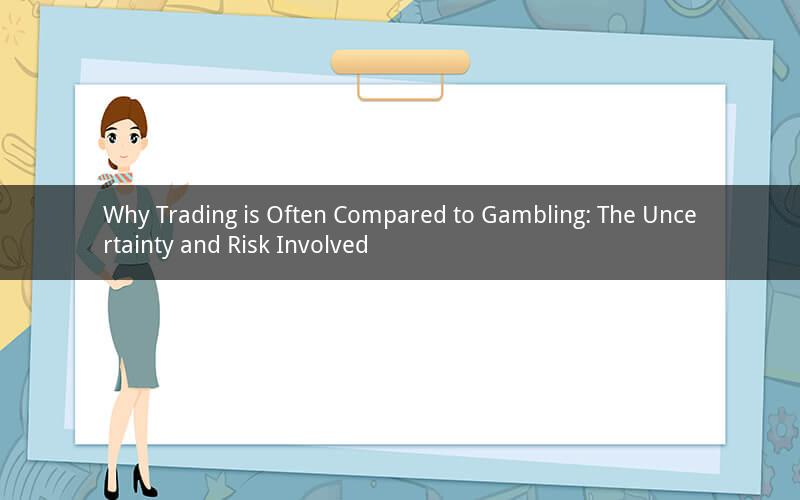
In recent years, the comparison between trading and gambling has gained significant attention. Many individuals perceive trading as a form of gambling, questioning its legitimacy and effectiveness. This article aims to delve into the reasons behind this comparison and shed light on the uncertainty and risk involved in trading.
1. Uncertainty of Outcomes
One of the primary reasons why trading is often likened to gambling is the uncertainty of outcomes. In both trading and gambling, participants enter the game with the hope of winning, but the outcome is uncertain. In trading, this uncertainty arises from various factors such as market volatility, unpredictable market trends, and economic events. Similarly, in gambling, the outcome is dependent on chance and luck.
2. Lack of Control
Trading and gambling share a common trait of limited control over the outcome. In trading, investors rely on market analysis, technical indicators, and economic factors to make informed decisions. However, they cannot control the market's behavior, which can lead to unexpected losses. In gambling, players may have strategies and tactics to increase their chances of winning, but they ultimately have no control over the game's outcome.
3. Emotional and Psychological Factors
Both trading and gambling are influenced by emotional and psychological factors. Traders may experience greed, fear, and overconfidence, which can lead to impulsive decisions and significant losses. Similarly, gamblers may be driven by the thrill of winning, leading them to take excessive risks. The emotional rollercoaster experienced in both trading and gambling can blur the line between entertainment and serious investment.
4. Lack of Skill and Knowledge
Gambling is often perceived as a game of chance, but many individuals believe that trading requires skill and knowledge. However, just like gambling, the lack of proper skills and knowledge in trading can lead to significant losses. Without understanding market dynamics, risk management, and the principles of financial analysis, traders may end up with similar outcomes as gamblers.
5. Short-term Focus
Both trading and gambling are known for their short-term focus. Traders often aim for quick gains, employing high-frequency trading strategies or day trading. Similarly, gamblers are often attracted to games that offer instant rewards. This short-term mindset can lead to impulsive decisions and neglect of long-term financial goals.
6. Financial Risks
Trading and gambling involve substantial financial risks. Traders may lose their investment capital if they do not manage risks appropriately, while gamblers can face severe financial consequences if they lose more money than they can afford. The high stakes in both activities can lead to severe financial distress.
Frequently Asked Questions:
Q1: Why is trading considered risky compared to other investments?
A1: Trading is considered risky because it involves higher leverage, market volatility, and the potential for rapid losses. Unlike other investments such as bonds or stocks, trading requires constant monitoring and quick decision-making.
Q2: Can trading be considered a skillful activity?
A2: Yes, trading can be considered a skillful activity if an individual possesses knowledge of market analysis, risk management, and financial principles. However, the lack of skill and knowledge can lead to significant losses, making it akin to gambling.
Q3: Are there strategies to minimize the risk of trading?
A3: Yes, there are several strategies to minimize the risk of trading, including diversifying investments, setting stop-loss orders, managing leverage, and developing a well-thought-out trading plan.
Q4: How does trading differ from gambling in terms of potential rewards?
A4: While both trading and gambling can offer potential rewards, trading has the advantage of allowing investors to capitalize on long-term market trends and economic conditions. In contrast, gambling relies solely on chance and short-term outcomes.
Q5: Can trading be a viable career choice?
A5: Yes, trading can be a viable career choice for individuals who possess the necessary skills, knowledge, and discipline. However, it is important to note that trading carries significant risks, and individuals should approach it with caution and a well-defined financial plan.